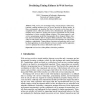Free Online Productivity Tools
i2Speak
i2Symbol
i2OCR
iTex2Img
iWeb2Print
iWeb2Shot
i2Type
iPdf2Split
iPdf2Merge
i2Bopomofo
i2Arabic
i2Style
i2Image
i2PDF
iLatex2Rtf
Sci2ools
118
click to vote
DASFAA
2009
IEEE
2009
IEEE
Predicting Timing Failures in Web Services
Abstract. Web services are increasingly being used in business critical environments, enabling uniform access to services provided by distinct parties. In these environments, an operation that does not execute on due time may be completely useless, which may result in service abandonment, and reputation or monetary losses. However, existing web services environments do not provide mechanisms to detect or predict timing violations. This paper proposes a web services programming model that transparently allows temporal failure detection and uses historical data for temporal failure prediction. This enables providers to easily deploy time-aware web services and consumers to express their timeliness requirements. Timing failures detection and prediction can be used by client applications to select alternative services in runtime and by application servers to optimize the resources allocated to each service.
Related Content
| Added | 19 May 2010 |
| Updated | 19 May 2010 |
| Type | Conference |
| Year | 2009 |
| Where | DASFAA |
| Authors | Nuno Laranjeiro, Marco Vieira, Henrique Madeira |
Comments (0)

